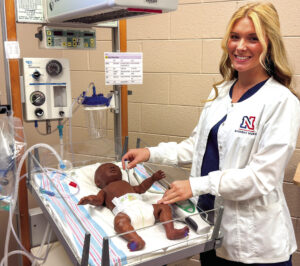Local activist concerned by state cancer report
Alabama is falling short on its legislative work to combat cancer, according to a new report by the American Cancer Society Cancer Action Network (ACS CAN).
How Do You Measure up?: A Progress Report on State Legislative Activity to Reduce Cancer Incidence and Mortality evaluates each state’s activity on issues crucial to winning the fight against cancer.
The report by ACS CAN, the advocacy affiliate of the American Cancer Society, finds that Alabama did not measure up to benchmarks in any of the 10 measured areas.
“State legislators must take action on laws and policies that help people fight cancer by emphasizing prevention, making health care affordable, curbing tobacco use and prioritizing quality of life,” said Ginny Campbell, ACS CAN government relations director for Alabama.
“Missed opportunities to pass laws fighting and preventing cancer could limit state revenue and health savings, but could also limit the potential for saving countless lives from a disease that will kill 10,430 Alabama residents this year.”
How Do You Measure Up? grades 10 key state policy areas nationwide: breast and cervical cancer early detection program funding; tanning bed restrictions for minors; physical education time requirements; smoke-free laws; tobacco prevention program funding; tobacco taxes; improved access to Medicaid; policies to prevent and treat pain and access to palliative care.
A color-coded system classifies how well a state is doing. Green shows that a state has adopted evidence-based policies and best practices; yellow indicates moderate movement toward the benchmark and red shows where states are falling short.
The report also offers a blueprint for effective legislation on matters such as effectively implementing the Affordable Care Act for cancer patients and their families.
The report showed that Alabama was in the red in the categories of Smoke-Free Law, Tobacco Tax and Price Increase, Tobacco Tax Increase Rates, Tobacco Prevention and Cessation Funding, Indoor Tanning Bed Restrictions for Minors, Breast and Cervical Cancer Early Detection Funding, Access to Palliative Care and Medicaid Expansion.
Alabama was in the yellow in only two categories: Physical Education Time Requirements and Effective Pain Policy.
Several of these issues have been part of ACS CAN’s legislative agenda in Alabama in recent years, including indoor tanning legislation that would have prohibited people under the age of 18 from using tanning beds. However, the legislation did not pass during the last legislative session.
Russellville resident Belinda Johnson, a local member of ACS CAN, said issues like tanning bed prohibitions for minors are vital components in fighting against certain cancers.
“We don’t believe that minors have enough information to be able to make an informed decision when it comes to tanning bed use,” Johnson said.
“The research is there that shows the harmful effects, and young people should not be exposed to these dangers when they are unaware of just how harmful it can be.”
Funding for the Breast and Cervical Cancer Early Detection Program, which provides life-saving cancer screenings to uninsured and underserved women, has to be defended every year and is not adequate to meet the need in Alabama.
And, while a number of communities in Alabama have comprehensive smoke-free workplace policies, which prohibit smoking in all workplaces, including bars and restaurants, there is no statewide smoke-free law.
“For me, this is the biggest concern for our state,” Johnson said. “Second-hand smoke is a real danger that can cause cancer in many innocent people who are exposed to it each day.
“I have attended several seminars about making communities and workplaces smoke-free, and it’s something that people feel very strongly about on both sides of the issue.
“Those who lobby to refrain from a smoke-free workplace use the argument that a person who doesn’t want to be around cigarette smoke can find a different place to work, but in this economy, people don’t have the luxury of just selecting a different job.
“If someone wants to work in order to support themselves and their family, they should not have to worry about being exposed to the dangers of second-hand smoke.”
Nationally, the report finds that 38 states have reached benchmarks in only three or fewer of the 10 legislative priority areas measured by ACS CAN. Only 12 states and the District of Columbia met between four and six of the benchmarks. No states met the benchmarks in seven or more of the 10 policies measured by the report.
But even though the numbers don’t seem to add up for Alabama, overall, ACS CAN has made a difference over the past decade.
Since the first issue of How Do You Measure Up? was published 11 years ago, states have made tremendous progress toward implementing laws and policies that help fight cancer. In that time, 47 states increased their tobacco taxes more than 100 times and 24 states implemented comprehensive smoke-free laws covering bars, restaurants and workplaces.
Locally, Russellville Hospital recently instituted a smoke-free policy for their facilities and Northwest-Shoals Community College instituted a smoke-free policy at both their Muscle Shoals and Phil Campbell campuses.
Since being established in 1991, the National Breast and Cervical Cancer Early Detection Program (NBCCEDP) has served more than 4 million low-income and uninsured women and provided more than 10 million screening exams, and five states have passed comprehensive laws to prohibit the use of indoor tanning devices by those under the age of 18.
States are working on implementing new insurance market rules required under the Affordable Care Act (ACA), including consumer-based health insurance marketplaces and policies that ensure access and affordability of prescription drugs that can improve patients’ quality of life.
States are also considering whether to accept funds that the federal government has allocated to increase access to health coverage to hard-working adults and families through state Medicaid programs. To date, nearly half of all states have decided to accept the funding and many more states will continue to grapple with the decision into the 2014 legislative sessions.
Public health advocates continue to fight for smoke-free laws and regular and significant increases in state tobacco taxes, with a growing emphasis on tax parity for other tobacco products such as cigars, roll-your-own and smokeless.
And, as they say, the numbers don’t lie. All of this work is made necessary because in 2013, it is estimated that more than 1.6 million people in the United States will be diagnosed with cancer and more than 580,000 people will die from the disease.
In Alabama this year, it is estimated that 27,080 people will be diagnosed with cancer and another 10,430 will die of the disease.
“As advocates, we have a duty to inform the public about ways to prevent and treat cancer, but our voice is not enough if state and local policymakers don’t take action to fund and implement policies and programs that we know work,” Campbell said.
“The best solutions will save lives and possibly millions of dollars in health care costs, and in many cases, it would cost Alabama little or nothing to do the right thing.”
Johnson agreed that a more proactive approach from local citizens would make a tremendous amount of difference.
“I got involved with ACS CAN in 2006 as a way to make my voice heard and to try to find a way to make the state I live in a healthier place to live,” Johnson said.
“If more people would get involved and make their voices heard, we could make a bigger impact.
“We don’t have enough people speaking up, and because of that, our legislators think that their constituents are fine with the way things are and the current policies we have in place.
“It’s very disappointing that Alabama has lagged behind in these key areas, and I just encourage people to contact their legislators if they are also disappointed that we are not providing the protection our communities and our citizens deserve from things that can cause cancer in our families, our friends and ourselves.”
For more information about how to become involved with ACS CAN, visit www.acscan.org.








